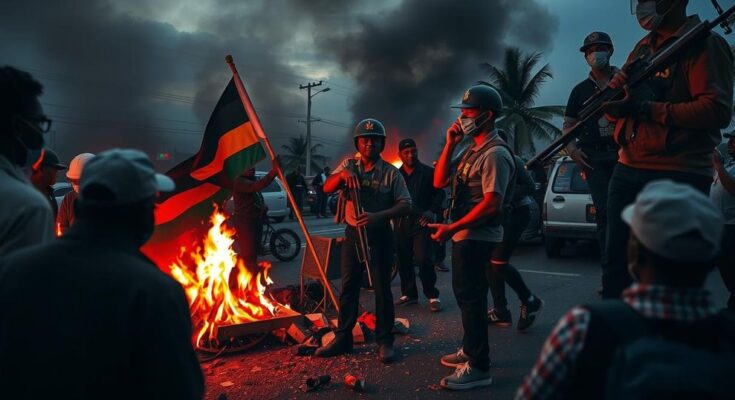Tensions in Mozambique surged after the killings of two key political activists tied to opposition leader Venâncio Mondlane. The victims were targeted in Maputo, following a contested election tainted by allegations of fraud favoring the ruling Frelimo party. Supporters of Mr. Mondlane had been mobilizing protests, reflecting broader discontent with the electoral process and governance in the country, which has faced criticism for nearly five decades of Frelimo rule.
Tensions have escalated in Mozambique following the tragic assassination of two political figures affiliated with the leading opposition candidate, Venâncio Mondlane. Elvino Dias, a lawyer, and a Podemos party official were shot and killed in their vehicle late Friday in Maputo amidst an atmosphere already charged by allegations of electoral misconduct in the recent presidential elections. Mr. Dias was actively planning to contest the election results legally, as independent observers reported significant irregularities favoring Daniel Chapo, the candidate for Frelimo, in a race where public interest was high due to the impending retirement of President Filipe Nyusi. Many citizens, particularly the youth, rallied around Mr. Mondlane, who openly criticized the election process and called for public protests after alleging electoral fraud. Tragically, Mr. Dias was one of the key organizers of a planned strike by Podemos that was scheduled to take place on Monday.
Mozambique stands at a pivotal juncture following its presidential election, where discontent among the populace is palpable due to accusations of voting irregularities. The election, which took place on October 9, featured Venâncio Mondlane emerging as a significant force among opposition candidates, resonating particularly with younger voters disillusioned by the status quo. The ruling Frelimo party has been in power since the country’s independence, leading to longstanding critiques regarding governance and electoral transparency. Following the violence, the political landscape becomes increasingly precarious, with calls for protests signifying the potential for widespread civil unrest.
The recent assassinations of key opposition figures in Mozambique represent a grave escalation in a politically tense environment marked by allegations of electoral fraud and corruption. As public outrage mounts over the integrity of the electoral process, the situation may evolve into significant civil discontent, posing profound implications for the country’s governance and democratic future. Stakeholders, both national and international, will be watching closely to see how the Mozambican government responds to this crisis.
Original Source: www.nytimes.com




